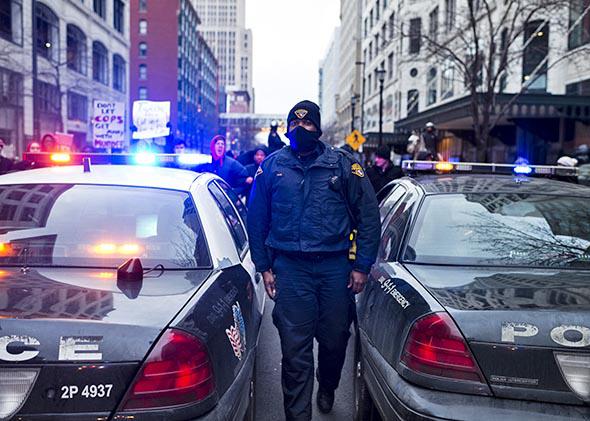Last month, in his speech on race and law enforcement, FBI Director James Comey asked Americans to better “see” police officers as full people. Yes, he declared, “those of us in law enforcement must re-double our efforts to resist bias and prejudice.” At the same time, he said, “citizens also need to really see the men and women of law enforcement … They need to understand the difficult and frightening work they do to keep us safe.
“If they take the time to do that,” Comey continued, “what they will see are officers who are human, who are overwhelmingly doing the right thing for the right reasons, and who are often operating in communities—and facing challenges—most of us choose to drive around.”
Comey is right. Of the nearly 800,000 police officers in the United States, most are decent people doing the best they can to uphold the law and protect their communities. A select group of officers is very good at its job. Most others are fine. Some are bad, and a small minority of them are destructive to their mission, their department, and their colleagues.
Here’s the problem: While most professions will tolerate poor performance, they won’t stand for damaging behavior. A cook who occasionally flubs his order might keep his job; a cook who contaminates food and poisons customers will almost certainly lose it. But modern American policing is different.
Officers hold great power and discretion, but that doesn’t seem to come with responsibility or accountability. In all but the most egregious cases, bad and destructive cops are virtually immune from the consequences of their actions, even when they lead to death or serious injury. What’s more, unlike the journalist shunned for fabulism or the lawyer disbarred for theft, the officer accused of brutality can expect the full support of his colleagues and superiors. Some of this is understandable: It’s often hard to know exactly what happened in a police-abuse case, and it makes sense to err on the side of the officer. But there are times when that choice is ludicrous—when an officer is clearly in the wrong, but the department stands with him anyway.
This is the situation in Cleveland, Ohio, where the police department is in full support of the two officers who killed 12-year-old Tamir Rice—and where the city is now claiming Rice bears responsibility for his own death. Anyone who’s seen the surveillance video of his killing would disagree. In it, a car zooms to where Rice is standing. Police had received reports that someone was holding a gun in a public park, but the gun was fake, and the “someone” was a kid. Within seconds, an officer fires his weapon, fatally wounding Rice. The cops refuse to give him aid, and when his teenage sister arrives, they tackle her. Paramedics eventually arrive, and they take Rice to a nearby hospital, where he dies.
Both officers have checkered records. The shooter, Timothy Loehmann, was a washout. Superiors at a previous posting described him as “unable to follow basic functions as instructed” and visibly “distracted” during weapons training. “Individually,” wrote his former boss, “these events would not be considered major situations, but when taken together they show a pattern of a lack of maturity, indiscretion and not following instructions. I do not believe time, nor training, will be able to change or correct these deficiencies.” The driver, patrolman Frank Garmback, was just as ill-equipped, albeit in a more typical way. In 2010, a resident sued him for “excessive force” after he choked her in her driveway. (She had called the police for help.) The city settled last year for $100,000.
These men never should have been on the street, where in their incompetence they’ve made life harder for other, better police officers. Yet both the city and the police union are behind them. “Tamir Rice is in the wrong. He’s menacing. He’s 5-feet–7, 191 pounds,” said Steve Loomis, president of the Cleveland Patrolman’s Association, citing a city autopsy report. “He wasn’t that little kid you’re seeing in pictures. He’s a 12-year-old in an adult body.” Responding to a lawsuit from the Rice family, attorneys for Cleveland maintain that Rice’s death was a result of his “failure … to exercise due care to avoid injury.” In other words, he all but killed himself. And at a recent community meeting, city police officers called for “more parenting classes” and more “responsible citizenship” in response to concerns over police violence and brutality.
Yes, the union has to represent its members and the city has to avoid major costs. But none of this requires an attack on Rice or an attempt to show that his death wasn’t a tragedy. You can fulfill your obligations to individual officers without blaming the family or defending Loehmann and Garmback as good, blameless cops.
More broadly, where are the actual good cops in all of this? Where are the men and women who have to deal with the fallout from the death of Rice? They exist, and of everyone in this drama, they should be the loudest voices for better training and accountability, if only because it helps them and their jobs. As always, they’re quiet. They may not like the Loehmanns and Garmbacks of the world, but right now they look awfully content to let the actions of such poorly suited officers speak for the whole.
